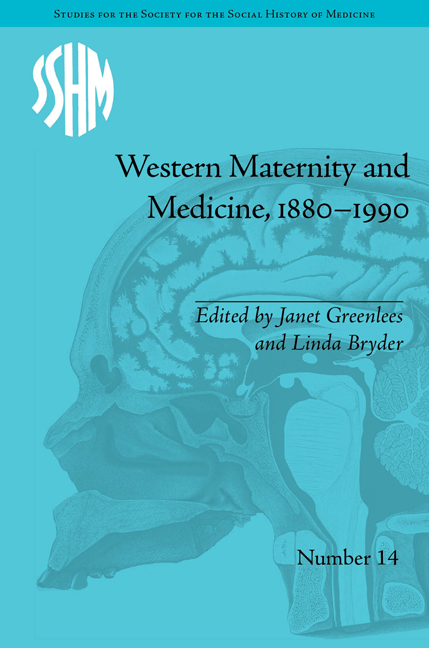Book contents
- Frontmatter
- CONTENTS
- Acknowledgements
- List of Contributors
- List of Tables
- Western Maternity and Medicine: An Introduction
- 1 Safely Delivered? Insights into Late Nineteenth-Century Australian Maternity Care from Coronial Investigations into Maternal Deaths
- 2 Pregnancy, Pathology and Public Morals: Making Antenatal Care in Edinburgh around 1900
- 3 ‘The Peculiar and Complex Female Problem’: The Church of Scotland and Health Care for Unwed Mothers, 1900–1948
- 4 Taking ‘Advantage of the Facilities and Comforts … Offered’: Women's Choice of Hospital Delivery in Interwar Edinburgh
- 5 ‘What Women Want’: Childbirth Services and Women's Activism in New Zealand, 1900–1960
- 6 'Twixt God and Geography: The Development of Maternity Services in Twentieth-Century Ireland
- 7 Test Tubes and Turpitude: Medical Responses to the Infertile Patient in Mid-Twentieth-Century Scotland
- 8 Women's Experiences of the Maternity Services in Berkshire and Oxfordshire, c. 1970–1990
- 9 From Muller to Johnson Controls: Mothers and Workplace Health in the US, from Protective Labour Legislation to Fetal Protection Policies
- Notes
- Index
3 - ‘The Peculiar and Complex Female Problem’: The Church of Scotland and Health Care for Unwed Mothers, 1900–1948
- Frontmatter
- CONTENTS
- Acknowledgements
- List of Contributors
- List of Tables
- Western Maternity and Medicine: An Introduction
- 1 Safely Delivered? Insights into Late Nineteenth-Century Australian Maternity Care from Coronial Investigations into Maternal Deaths
- 2 Pregnancy, Pathology and Public Morals: Making Antenatal Care in Edinburgh around 1900
- 3 ‘The Peculiar and Complex Female Problem’: The Church of Scotland and Health Care for Unwed Mothers, 1900–1948
- 4 Taking ‘Advantage of the Facilities and Comforts … Offered’: Women's Choice of Hospital Delivery in Interwar Edinburgh
- 5 ‘What Women Want’: Childbirth Services and Women's Activism in New Zealand, 1900–1960
- 6 'Twixt God and Geography: The Development of Maternity Services in Twentieth-Century Ireland
- 7 Test Tubes and Turpitude: Medical Responses to the Infertile Patient in Mid-Twentieth-Century Scotland
- 8 Women's Experiences of the Maternity Services in Berkshire and Oxfordshire, c. 1970–1990
- 9 From Muller to Johnson Controls: Mothers and Workplace Health in the US, from Protective Labour Legislation to Fetal Protection Policies
- Notes
- Index
Summary
In 1904 the Church of Scotland established a Committee on Social Work (CSW). With the broad aim of ‘providing social services irrespective of class, creed or colour based on Christian gospel and carried out by committed Christian men and women’, their network of health and social services gradually expanded so that by World War II, the Church was the largest single provider of social services in Scotland. While some services targeted men, young single women living in cities were prioritized due to fears about rising immorality amongst young people and from the belief that women were the moral guardians of the family. To address these anxieties and complement existing charitable provision, the Church of Scotland opened a network of hostels, ‘preventive’ homes for single, ‘friendless’ girls and boarding houses. And, in 1915, they opened a maternity home for unwed mothers in Glasgow to meet a ‘very pressing need’. Combined, these services sought to address the ‘peculiar and complex female problem’ present in Scotland's cities, but it was the Church of Scotland's home for unwed Scottish mothers that secured the Church both medical and civic recognition for its high standards of maternal health and social care, while also meeting the Church's evangelical and political objectives.
The Church's entry into social work coincided with broader British anxieties about the health of the nation and a need for national efficiency.
- Type
- Chapter
- Information
- Western Maternity and Medicine, 1880–1990 , pp. 47 - 64Publisher: Pickering & ChattoFirst published in: 2014



